Do you ever feel distant from the real (insert place name here) when you are traveling? Like a tourist rather than a traveler? Deepening your travel connections to people will make all the difference. As an introvert, I often feel like I am on the outside of the action, but doing some of these things has made a huge difference.
Human beings are wired to connect with one another, creating social, emotional, and even physical, well-being. But what about the benefits of human-to-human connection when traveling? Most of us have lovely interactions with service workers on our trips-hotel workers, wait staff, tour guides, etc. This is a good start, but there are so many rewarding connections that we could make if we opened our experience to everyone.
Jay is so good at this. He is a natural extrovert, very curious, and sees everyone as a potential friend. Also, he has no concern about looking goofy, which helps a lot. I have to admit that he sometimes pushes me out of my comfort zone, but it that needs to happen sometimes. Or maybe even most of the time.
So let me pull a few scenes from our travels that illustrate ways to transform curiosity into deeper connections that, when piled on top of each other, make the world a better place.
If you don’t have time for the full post, here’s the summary: ask questions, put yourself in the way of fun, become regulars, say yes, buy something, journal together, share your ride, and play music. It would be more fun if you didn’t stop reading here though.
1. Ask questions and get a sardine can violin, the proceeds will pay a dowry
The heat had been making the dusty road in front of us look vaguely unreal for several hours before we pulled into the cafe. I assumed it was a cafe because there was a sign exclaiming “Tea!” and “Coke!” As we drank our warm cokes from glass bottles Jay asked about the art pieces on the wall. Youssef proudly showed us his violins made from sardine cans. Jay learned that Youssef wasn’t married because he was saving to pay a dowry. So we bought the violin and some Berber jewelry made by his sister because how can you not fund a wife? I’m pretty sure there was no love story involved here, marriage sounded a bit more transactional in Youssef’s community. The sound of Youssef’s violin echoing over the High Atlas mountains in Morocco does conjure visions of romance gone awry.
2. Take the kid to the town square and she’ll make friends
Well, at least that is what our 3 year old did. We went to the park in Grecia, Costa Rica. There were several kids playing with their grandmothers looking on. At some point Beija couldn’t stop herself from joining in. Young kids don’t have to be coached on presence and authenticity–they just are. These kids counted to each other in English and Spanish and had a great time. We enjoyed relaxing in the square and watching city life unfold. Check out our full Costa Rica kid itinerary here.
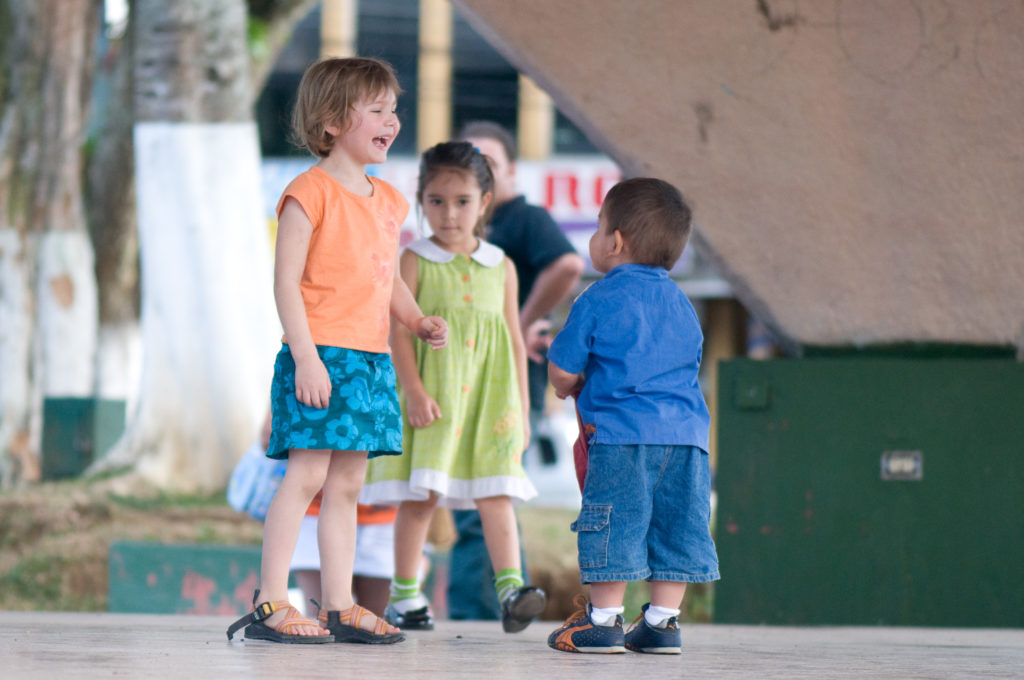
Beija and her two new friends in Grecia, Costa Rica.
3. Become regulars at a café
Instead of hopping from one café to another during our stay in Dubrovnik, Croatia we decided to become “regulars” at one café. Damiano became our favorite waiter and we asked him a lot of questions about his work and his life. He brought Beija extra cakes and we talked a lot as he danced between tables. Check out our full Balkans kid itinerary here.
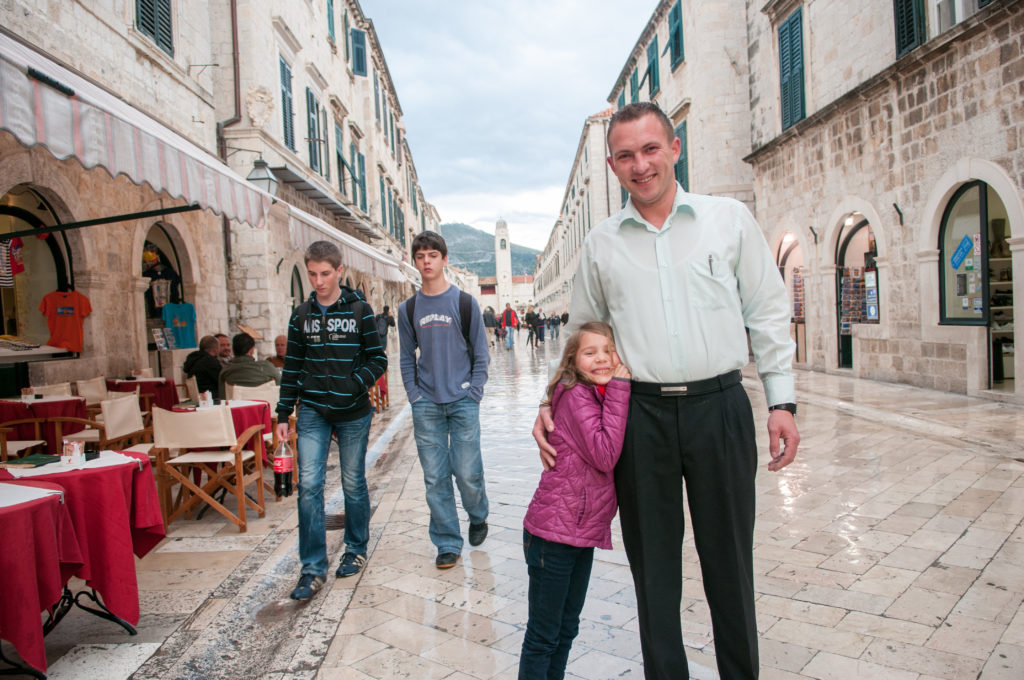
Beija and Damiano on the stradun in Dubrovnik, Croatia. Look at that smile!
4. Say “yes” way more often than it feels comfortable
Would you let this man pick you up? Would you let him feed you hot who-knows-what with a spoon? We did. I guarantee you that we would have had so much less fun if we had politely declined. Mr. Barrada, the restaurant owner in Fez, Morocco did handstands, backflips, dragged us back into his kitchen, and loved Beija so much. He spoke little English and our Arabic was pretty fuzzy, but we communicated through laughter and presence.
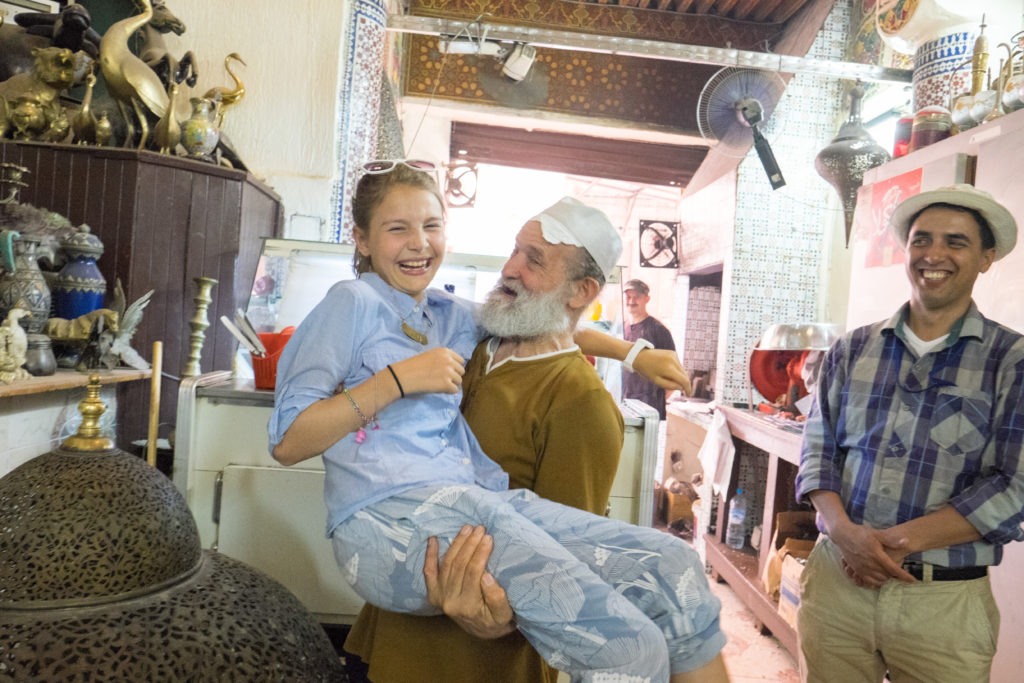
Beija somewhat hysterical about being lifted off the ground in Fez, Morocco.
5. Buy something and you may get a dinner invitation
There are some places where hustle is a way of life. We met this man in the High Atlas mountains in Morocco. And while we weren’t really in the market to carry heavy rocks around in our backpacks, giving in and buying a few rocks opened up the conversation beyond making a sale. He spoke English, Spanish, Berber, Arabic, and probably several other languages. We really enjoyed hearing him talk about his fossils and his family who lived in a Berber tent on the other side of the lake with lots of sheep. 100% true? Maybe, maybe not. But it didn’t really matter. We had a great time but did turn down the invitation to dinner.
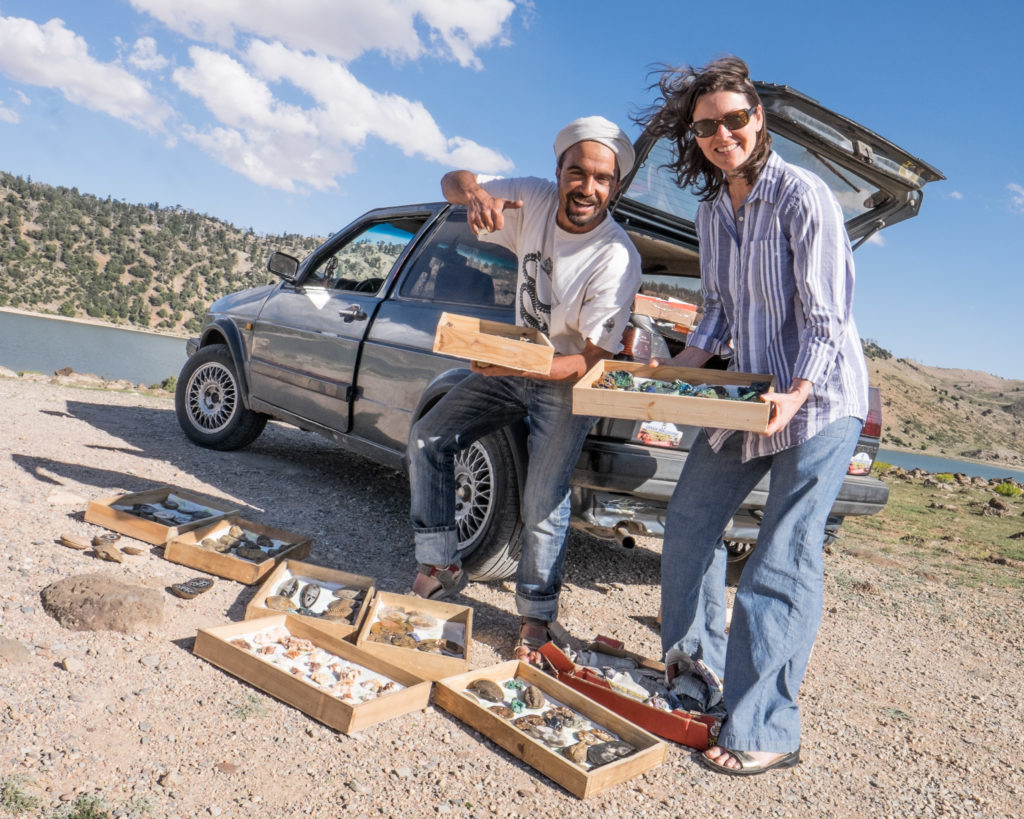
I did buy some fossils from this dramatic man at Aguelmame de S’Ali in the Middle Atlas Mountains.
6. Break out the journal and draw together
Jay’s journal became a set of community documents in Chandeni, Nepal. The kids drew maps of the area, wrote their names, practiced their English words, and taught him the Nepali alphabet. Full of smudges from all the different hands that got to participate, it was an incredible bridge with both the extroverted kids who had great language skills and the younger or more introverted kids.
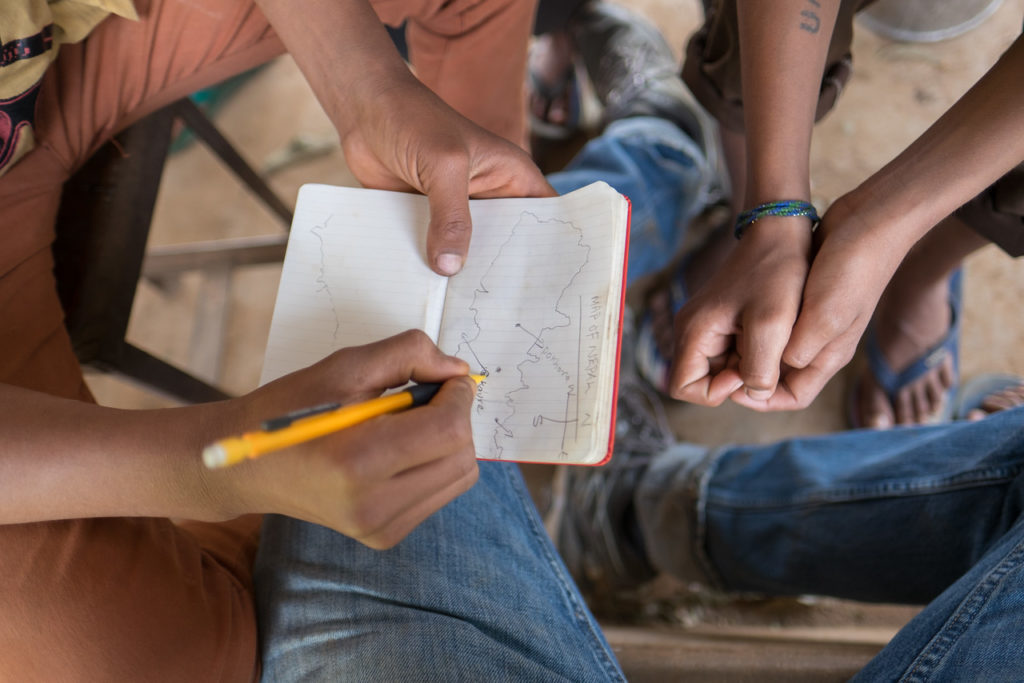
The magic journal in Chandeni, Nepal.
7. Open up your ride
People in the way-out often have a hard time getting around. If you have a vehicle, share it! Lots of opportunities to talk to people and hear about what they are doing that day. We loved talking to this father and daughter on the Quilotoa Loop in Ecuador.
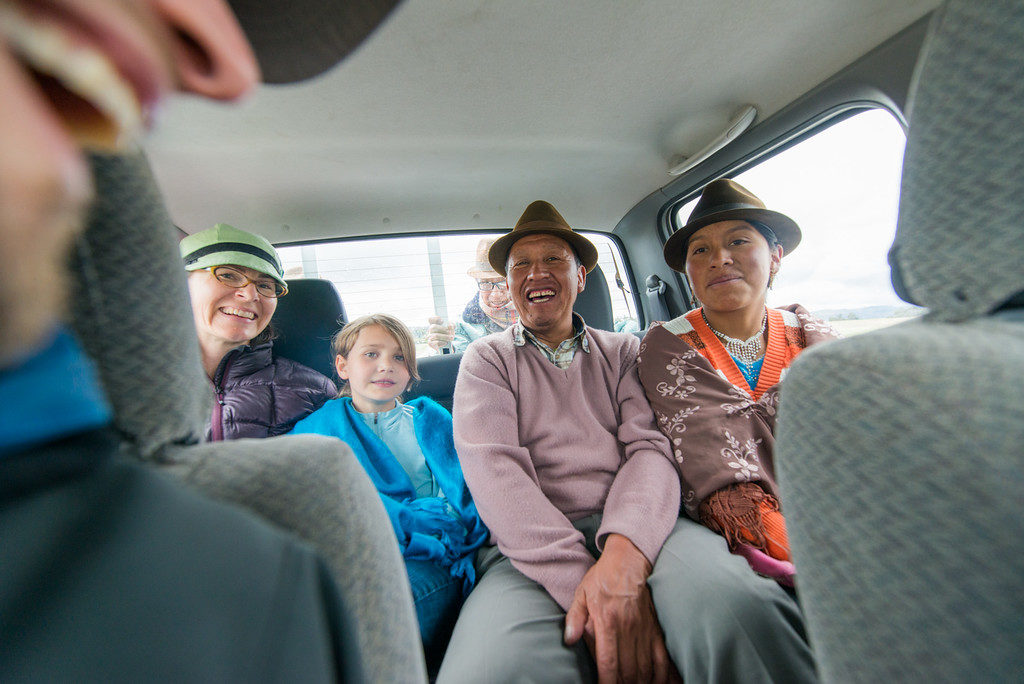
A shared ride on the Quilotoa Loop in Ecuador.
8. A pink guitar leads to a week of sha-la-la echoing across the village
Every time Jay pulled out his pink guitar in Chandeni, Nepal the kids would call for Van Morrison’s Brown Eyed Girl. They loved to sing his songs and jump in with songs of their own. Great kids. Read more about this in Jay’s detailed post.
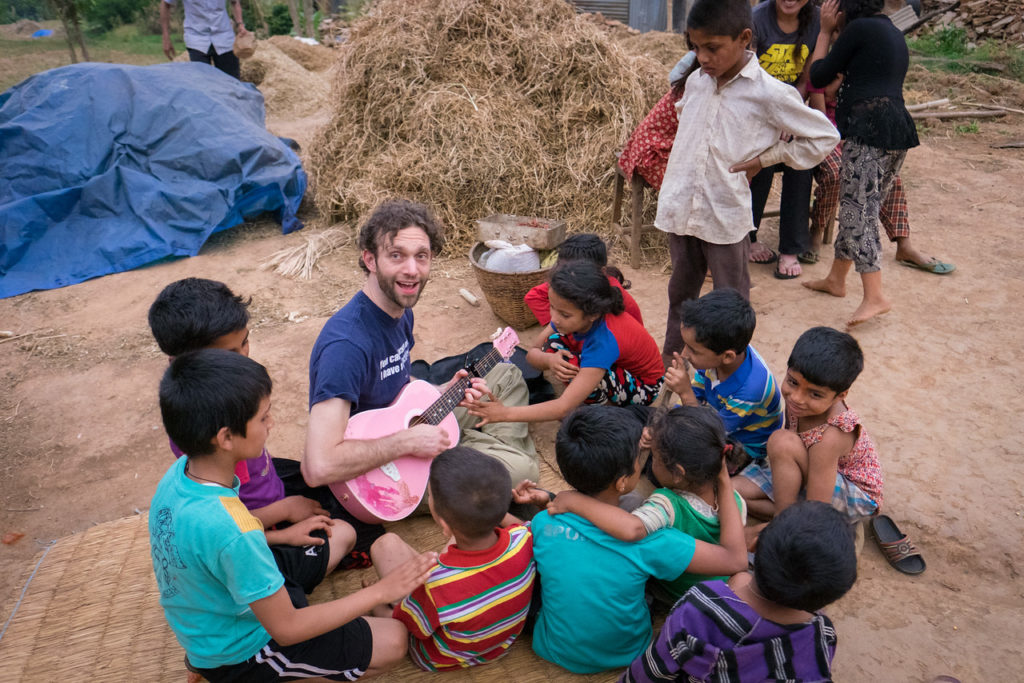
What are your connection stories?
It’s so great to see a family focus on what makes connections and how to do them. So many travelers miss the best opportunities which are often free by connecting with the locals in small yet meaningful ways. Jay, Kymber and Beija understand the real joy of travel is the local people and they are not afraid to reach out and try to communicate.